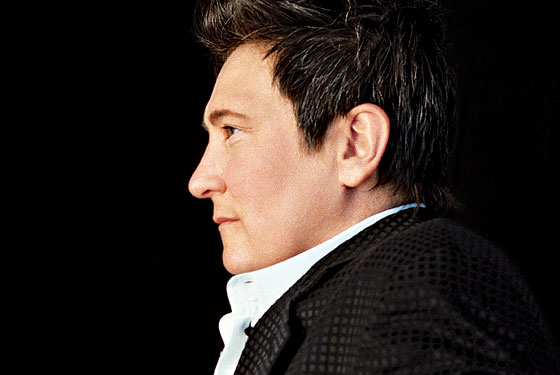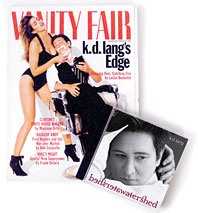
Of course, the most important thing is the voice. Even if you don’t like a single song k. d. lang has written or covered in her 25-year career, you just can’t argue with that sound she can make: the purity of it, the way it cracks open and fills out. That is what made it possible for her to achieve eminence in country music in her twenties and what prompted Roy Orbison to invite her to sing a duet of “Crying” with him in 1987. But that is not the only thing that made lang wildly famous—the first lesbian superstar—when the eighties gave way to the nineties.
She was a thrilling creature, rangy and stunning and suave—a mink in a men’s suit. But Madonna’s famous quote upon meeting lang, “Elvis is alive … and she’s beautiful!,” kind of missed the mark. Because lang wasn’t beautiful or pretty, she was handsome. She was butch. Never before had Americans seen female masculinity so overtly and unapologetically on display, and we couldn’t take our eyes off it. The reason that notorious Herb Ritts cover of Vanity Fair with lang reclining in a tie in a barber’s chair while a barely dressed Cindy Crawford shaved her face made such a splash, rendered some people so irate and others so aroused, was that it suggested that lang was the kind of woman who probably enjoyed doing all sorts of things with women that only men are supposed to get to do. And that there were women who wanted her to.
Lang’s biggest hit, “Constant Craving,” like most of the songs on her breakthrough platinum pop album, Ingénue, was about the excruciating thrill of obsessive infatuation. This is precisely what lang elicited from her fans (not that I’d know), and it was very specifically what was on her mind at the time: The album was inspired by a woman lang was so besotted with she moved from her native Canada to Los Angeles to be near the home the object of her desire was already sharing with someone else.
Watershed, lang’s first album of original material in eight years, is in many ways a counterpoint to Ingénue. It is the same miraculous voice, of course, but early in her career, lang was interested in seeing what it could do; now she is more invested in restraint and careful not to upstage her lyrics. Lang is no longer a young unknown; she is 46 and has won four Grammys. She isn’t afflicted with the kind of dizzy passion that can “make your heart a one-track mind,” as she sings on this album; she now lives with her partner of six years, Jamie Price, whom she met through their mutual Buddhist teacher. In past interviews, lang has said that she used to “gravitate towards chaotic experiences for inspiration … by having an affair or just breaking up.” On Watershed, the beds of past lovers are refigured as “cold, dark places, places I’ve been.”
That’s not to say that Watershed is an ode to domestic bliss. “I will drive you crazy … once in a while,” lang sings, in an anthem of consolation to the monogamous. Watershed is about acceptance of (or resignation to) the fact that marriage is fulfilling but only occasionally exciting. “That song ‘Once in a While’ is like a bittersweet promise,” lang tells me. “Going, it’s all good except for that one thing. It really is just knowing that things aren’t always perfect, and I’m certainly not perfect. It’s just kind of an honest ingredient label.”
On “Thread,” lang sings about the frustration of fighting that apparently plagues even Buddhist couples. “At a certain point in a relationship you start negotiating things, I guess boundaries,” she says. “You start really getting your lives integrated, and that’s definitely a negotiation. And being on the road for a year at a time,” as lang is about to be, “is really hard because all your insecurities come to the surface, just being away and this supposedly glamorous life.”
I ask her if it’s only supposedly glamorous, and she laughs. “It’s only as glamorous as where we are right now. That’s about it.”
Where we are right now is a windowless conference room in the American Airlines Admirals Club at Kennedy Airport; lang is on her way home to Los Angeles for a week after performing several shows in Europe. It is hot and airless and antiseptic, and lang is sweating profusely in a heavy sweater. “Sorry,” she says. “I’m dying over here.” I ask her if she doesn’t have a T-shirt on underneath. “Yeah, I do,” she says. “But I’m not taking my sweater off in front of you.”
Lang has gotten big. She is more panda bear than mink now, with her salt-and-pepper hair and her vaguely Inuit eyes (lang was raised in a small town on the border between Alberta and Saskatchewan, her heritage is Icelandic, Sioux, Dutch, English, Irish, Scottish, and German Jewish), but she still has the unmistakable appeal of the unreconstructed butch. Or at least it looks that way to me. “You mean like the actual physical appearance of my person?” she says. “Is that what butch is? How do you define butch?”

Which renders me speechless. k. d. lang, king of the bulldaggers, is asking me what butch means.
“Okay, well, yeah, I am butch, I guess. In my physical appearance. When I show up at the White House and George and Laura just about have a heart attack because they can’t figure out who the fuck I am—or what I am—because I’m in a tuxedo, yeah. Or when every single time I walk into the washroom in an airport, even being famous, people … think they’re in the wrong washroom, yeah. I think about it.”
But it is not, as I had assumed, something lang is proud of or even really aware of—that she is the only truly famous truly butch woman alive.
“I haven’t thought of it quite like that,” she says, and then begins speaking in Buddhist. “I guess concepts of gender are kind of funny to me. I just find them to be as illusive as anything where we concretize our thoughts on something. Just when we have our mind set on the way something is, and of course, it never is that. There may be some truth to that, but there’s the opposite truth to everything, so to me it’s just a matter of being comfortable and confident in who I am, and I think of myself as, like, spiritually, kind of a combination of male and female. The physical thing is just so beside the fact to me, if that makes any sense. I don’t know. This is a can of worms that you opened up here. I embraced my butchness again, when was it? I kind of went through a period right before Ingénue where I wanted to be a little more feminine, and then I kind of went, Fuck it. I like being a little butch actually.”
“A little!” I shriek.
“Am I that butch?”
“Aren’t you?”
She smiles. “Now I’m going to leave here with a brand-new sense of accomplishment.”